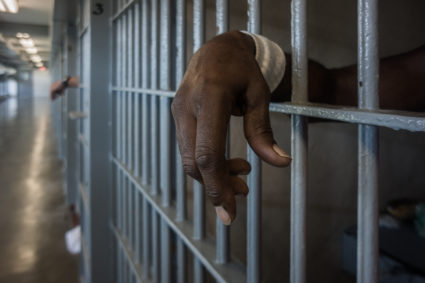Our February pick for the PBS NewsHour-New York Times book club is Shane Bauer's "American Prison." Become a member of the Now Read This book club by joining our Facebook group, or by signing up for our newsletter. Learn more about the book club here.
Below are questions to help guide your discussions as you read the book over the next month. You can also submit your own questions for Shane Bauer on our Google form. Bauer will answer reader questions on the PBS NewsHour broadcast at the end of the month. WARNING: Spoiler alert on questions further down
- How does author Shane Bauer grapple with the ethics of going undercover as a prison guard at Winn? What do you think of his decision to report the story in this way?
- How does Bauer's own previous experience as a prisoner in Iran affect the way he treats and interacts with Winn prisoners?
- Early on in the book, Bauer writes that "evil is incremental — something we are all capable of given the right circumstances." How does Bauer gradually change during his time at Winn?
- Bauer writes that private prisons developed as a way to support the U.S. economy when it could no longer rely on slave labor. Do you feel that this industry is still steeped in the legacy of slavery? If so, how?
- In one chapter, Bauer tells the story of Martin Tabert, whose death in a convict camp pushed Florida to end convict leasing. How is Tabert's race significant to that story?
- In talking about a fellow prison employee, Miss Doucet, Bauer says that she is "already making mental adjustments to her dreams" because of how low the pay is at Winn. Why do you think Bauer's colleagues took these jobs, rather than seek out work elsewhere?
- "We want them, for lack of a better term, to feel like a herd of cattle," Assistant Warden Parker says in one conversation with Winn employees. What are the consequences of treating Winn prisoners this way?
- How would you describe the power structure of Winn prisoners, employees, and the corporate and federal entities that oversee the correctional center?
- Bauer recounts how two Frenchmen, Alexis de Tocqueville and Gustave de Beaumont, warned against the privatization of American prisons in the 1830s. What did you make of their warnings?
- Did this book remind you of other depictions of U.S. prisons in pop culture? How do they compare to Bauer's portrait of incarceration in America?
- At one point, a prisoner tells one of Bauer's colleagues that "inmates run this" prison. Does that ring true to you? In what ways?
- At the end of the book, Bauer reunites with the inmate Corner Store after he is released from Winn. A year later he is back in prison. How do you understand some of the troubled people who Bauer meets? Were you able to empathize with them?
- What did you learn from this book that you didn't know about the U.S. prison system before? What revelations about the past or present surprised you the most?
- Bauer's reporting prompted a Department of Justice investigation into private prisons, and the federal government announced it would stop contracting with them in 2016. While this policy was reversed under the Trump administration, what does it say to you about whether journalism can affect policy change?
- Do you think the private prison industry can somehow be reformed?
- Does the larger U.S. prison system need to change? If so, how?
Support Canvas
Sustain our coverage of culture, arts and literature.

